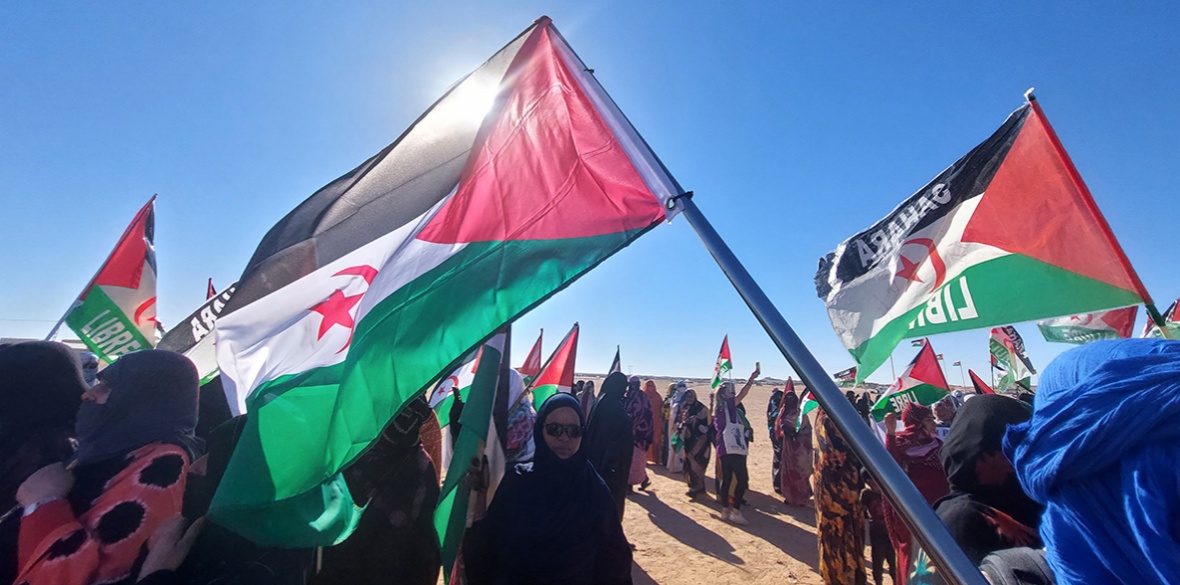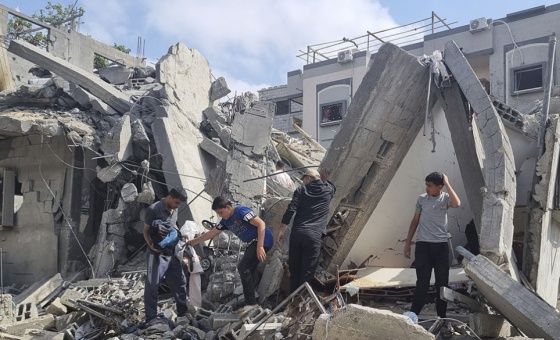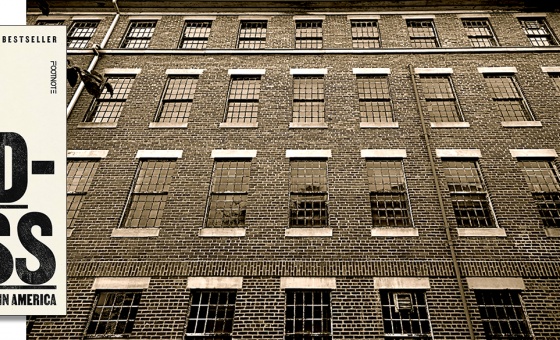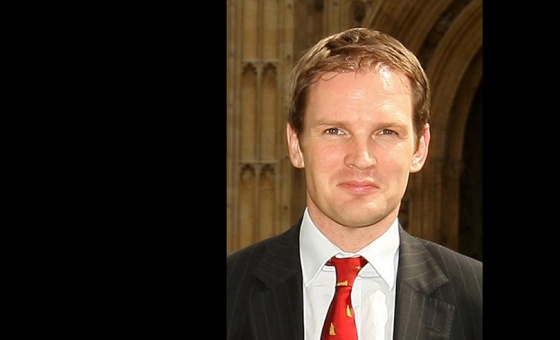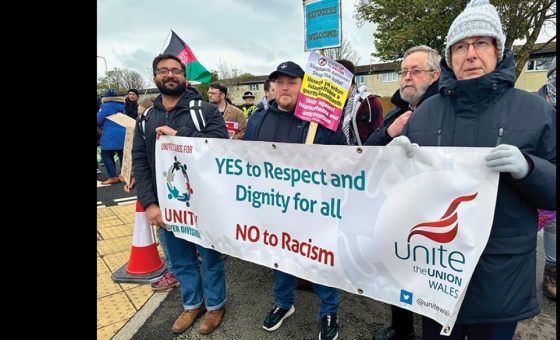This is the last article you can read this month
You can read more article this month
You can read more articles this month
Sorry your limit is up for this month
Reset on:
Please help support the Morning Star by subscribing here
“WE ONLY wish to have the right to exist, to decide our future and to return to our country to live freely without fear.”
These words have been ringing in my ears ever since I heard them uttered by Fatimetu Malainin, a Saharawi woman who was born in refugee camps in south-west Algeria where she has grown up. Now 27 years old, she is married with a second child on the way and teaches music to children in an after-school programme in Boujdour camp, where she also lives. The camp is one of five that currently house nearly 200,000 Saharawi refugees.
This year, along with tens of thousands of other Saharawi women, Fatimetu will once again be celebrating International Women’s Day on March 8 in the harsh desert camps of her exile. For some of the women, it will be their 49th year. Despite all the time that has passed, they still hold on to the hope of achieving justice and peace and returning to their homeland.
Most people in Britain will be neither aware of the existence of a people called the Saharawi nor of their long-standing cause to achieve independence and end the illegal Moroccan occupation of their homeland in Western Sahara, a former Spanish colony in north-west Africa. Unfortunately, the invisibility of their story is the fate of people’s struggles from around the world which do not get media attention.
Western Sahara is roughly the size of Britain and, according to the UN, is Africa’s last colony. When neighboring Morocco forcibly annexed the territory in late 1975, it interrupted the decolonisation process from Spain. Not only that, its invasion followed only a few weeks after the International Court of Justice had ruled that Morocco had no sovereignty claims over Western Sahara, reaffirming the rights of the Saharawis to self-determination instead.
The consequences of Morocco’s actions were dire. Not only did it scupper the independence aspirations of the indigenous Saharawis, but it sparked a war in the region with the Polisario Front, their liberation movement, which had emerged to end Spain’s colonial rule by armed struggle.
It also led to the mass exodus and displacement of over half the civilian population to become refugees in neighbouring Algeria. And with the war came the building, by Morocco, of the longest military wall in the world — the Berm — to defend its occupation. Running 2,700km in length from north to south, it divides a people and their land and is a killing field with an estimated seven million landmines used to reinforce it.
Back in the summer of 1991, a quirk of fate took me to the refugee camps for the first time. I arrived at a pivotal moment in the Saharawi struggle. After 16 years of war, the UN had succeeded in negotiating a ceasefire between Morocco and the Polisario so it could organise a self-determination referendum for the Saharawis to vote for either independence or integration with Morocco.
The latter option was included as a precondition for Morocco to accept the ceasefire, as it still claimed Western Sahara as its own. The vote was scheduled for early 1992 and hopes ran high in the refugee population that independence was finally around the corner.
On that trip I met Saharawi women for the first time too. Very quickly I discovered they were the heart and backbone of the independence cause, that they had built the refugee camps from scratch, with virtually no resources, in one of the most hostile and barren desert environments I had ever known, and had been running every aspect of camp life while their menfolk fought at the warfront.
The first two women I met were Senia Ahmed and Jira Bulahe, who both held leadership positions within the National Union of Saharawi Women.
Gathered in a spacious tent located within a large encampment that had been set up as a residential vocational school for the refugee women, they began by sharing their vision of the women’s role in a future independent country. They talked with great clarity of the steps they were taking to ensure full equality with men and not lose the gains they had made in the war.
The truth is that the power and determination these women projected awed and intimidated me in equal measure and shattered any trace of stereotypes I still held about women in the Muslim world. The more I learnt the more I became inspired and it is because of these women that I was drawn into their cause and my life path radically changed.
Zoom ahead 33 years: the referendum still hasn’t taken place, hostilities restarted in 2020 and the Saharawi cause is still largely unknown. Meanwhile, the women I met a lifetime ago still languish in refugee camps, dependent on aid to survive and witnessing yet another generation being born into exile.
Tragically, the international community has repeatedly failed the Saharawis in upholding the principle of self-determination and, even worse, it has allowed Morocco to entrench its brutal occupation further and to violate Saharawi human rights on a daily basis with impunity.
Saharawi women, again, have been at the forefront of the struggle to resist the injustices of the occupation in Western Sahara. The media blockade imposed by Morocco in the territory, however, means that you are unlikely to have heard of figures like Aminatou Haidar, Sultana Khayat and many others who have paid a high price for their leading role as human rights defenders.
The Saharawis may be a people divided by occupation, exile and dispersal but they are united in their convictions to fulfil their historic self-determination rights. This year the Saharawi women, in partnership with the International Platform of Women for Western Sahara (a Spanish initiative called PIMSO), hope to mobilise large numbers of women from around the world to join them in the refugee camps for a week in late October. The idea is to learn about their reality first hand, participate in a march of strength and unity to show solidarity with them and other women living under occupation and as refugees and to create strategies to break the status quo.
Jira, Senia, Fatimetou, Aminatou, Tarba, Shueta, Embarca, Nanaha, Ezza, Takween, Tutu, Selma … these are only a handful of the many remarkable Saharawi women I have met throughout the past three decades. Their spirit is indomitable and one thing they have taught me is that the easiest thing is to give up hope, which neither I nor they have any intention of doing.
Danielle Smith is the founder of Sandblast arts, a UK volunteer-led charity dedicated to raising awareness of the Saharawi cause and empowering the refugees through creative education.
To learn more go to sandblast-arts.org or if you are interested to join the Saharawi refugee women in October contact [email protected].

